Overview
To achieve successful irrigation machine rental, it is essential to follow five critical steps:
- Understand the various types of machines available.
- Assess your project requirements to ensure you select the right equipment.
- Choose a reputable rental service that can provide reliable support.
- Review the rental terms carefully to avoid any misunderstandings.
- Handle and maintain the equipment properly to ensure it performs optimally throughout your project.
This structured approach emphasizes the importance of matching the right equipment to your specific needs, ultimately leading to a smooth and efficient rental experience.
Key Highlights:
- Different types of irrigation machines include Sprinkler Systems, Drip Irrigation, Soaker Hoses, Centre Pivot Systems, and Subsurface Irrigation, each suited for specific applications.
- Assess project requirements by measuring the area, evaluating plant types, checking liquid supply, understanding soil types, and establishing a budget.
- Select a reputable rental service by researching options, checking reviews, inquiring about equipment condition, evaluating customer service, and comparing pricing.
- Review rental terms including lease duration, usage limits, insurance requirements, maintenance responsibilities, and any deposits or fees.
- Properly handle and maintain the irrigation machine by reading the manual, inspecting before use, cleaning after use, storing correctly, and reporting issues promptly.
Introduction
Navigating the world of irrigation machine rental can be a daunting task, given the myriad of options available and the specific needs of different projects. Understanding the various types of irrigation systems—from sprinkler setups to subsurface solutions—empowers individuals and businesses to make informed decisions that enhance efficiency and conserve resources.
However, the key challenge lies in effectively assessing project requirements, selecting a reputable rental service, and ensuring proper maintenance throughout the rental period.
How can you ensure a seamless experience while maximizing the benefits of irrigation machine rental?
By exploring the available services and understanding the benefits of each tool, you can make choices that lead to successful project outcomes.
Understand Different Types of Irrigation Machines
Before considering irrigation machine rental, it is essential to familiarize yourself with the various types available.
- Sprinkler Systems are ideal for expansive spaces, distributing liquid through a network of pipes and spray heads. These systems ensure even coverage, making them a reliable choice for larger areas.
- Drip Irrigation supplies moisture directly to the roots of plants, significantly minimizing evaporation and runoff. This method is highly efficient for gardens and crops, ensuring that every drop counts.
- Soaker Hoses allow liquid to seep out gradually along their length, making them perfect for flower beds and vegetable gardens. This gentle watering method promotes healthy growth without the risk of over-saturation.
- Center Pivot Systems are commonly employed in agriculture, rotating around a pivot point to irrigate large fields efficiently. Their design maximizes coverage and minimizes labor, making them a preferred choice for many farmers.
- Subsurface Irrigation involves burying pipes underground to deliver water directly to the root zone, effectively reducing evaporation. This method is particularly beneficial in arid regions, where water conservation is crucial.
Understanding these categories will assist you in selecting the appropriate equipment, including irrigation machine rental, tailored to your project needs. Engage with us today to explore your options and ensure a successful irrigation solution.
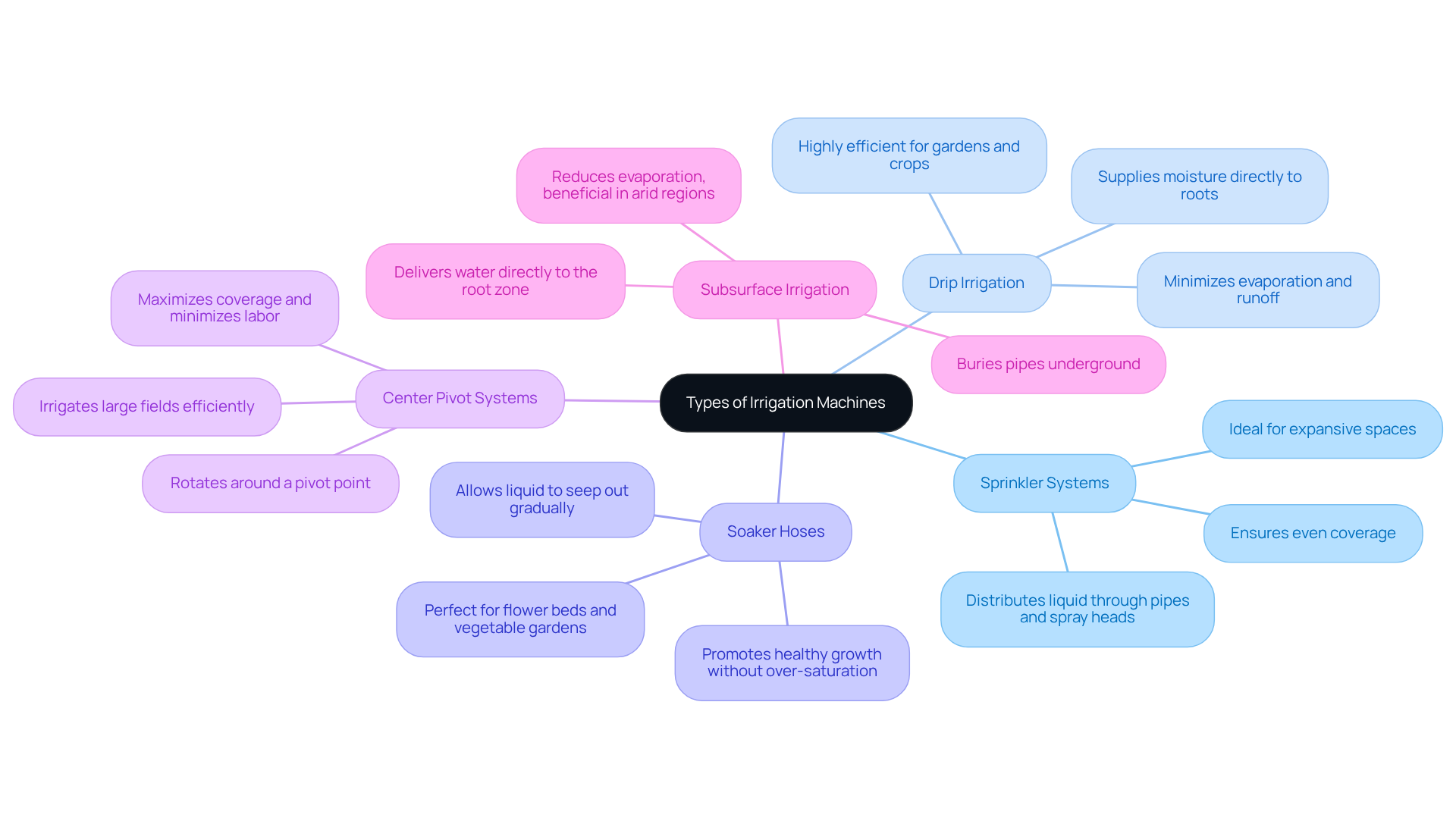
Assess Your Project Requirements for Irrigation
To effectively assess your project requirements, it is essential to follow these critical steps:
- Identify the Area: Begin by measuring the total area that requires irrigation. This foundational step is crucial in determining the type and size of the machine needed for optimal performance.
- Evaluate Plant Types: Recognize that different plants possess varying hydration needs. A thorough understanding of the specific requirements for the plants you are irrigating will ensure their health and vitality.
- Liquid Supply Availability: Assess the availability and pressure of your liquid source. This factor plays a significant role in influencing the type of irrigation system that will be most effective for your project.
- Soil Category: Acknowledge that various soil types absorb water at different rates. Familiarity with your soil type is vital in selecting the most suitable irrigation method to maximize efficiency.
- Budget Considerations: Finally, establish your budget for renting the necessary equipment. This decision will significantly narrow down your options and guide you toward the most viable solutions.
By meticulously evaluating these factors, you will be empowered to make an informed decision regarding the irrigation machine that best aligns with your project needs.
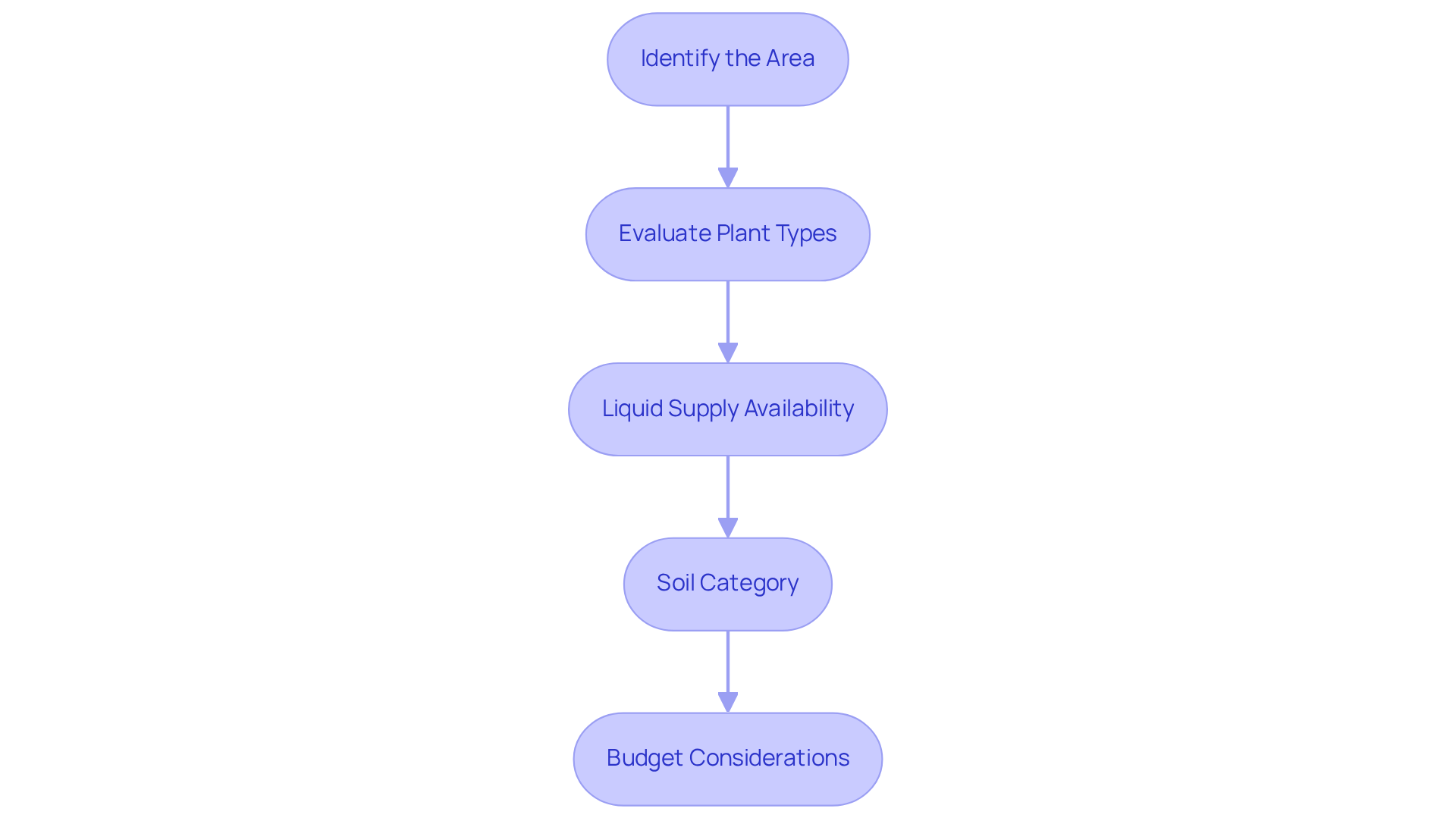
Select a Reputable Equipment Rental Service
When selecting an equipment rental service, it is essential to follow these guidelines to ensure you make an informed choice.
- Research Options: Begin by identifying leasing companies in your area, such as EZ Equipment Rental, which is well-regarded for its quality and reliability. This foundational step sets the stage for a successful rental experience.
- Check Reviews: Next, delve into customer evaluations and testimonials. These insights are invaluable for assessing the reputation of the leasing service and can provide a clearer picture of what to expect.
- Inquire About Equipment Condition: It is crucial to ensure that the company maintains its equipment in good working order. Ask about their maintenance practices to confirm that you will be renting reliable tools.
- Evaluate Customer Service: A reputable leasing service should offer knowledgeable staff ready to assist you in selecting the right equipment and addressing any inquiries you may have. Their expertise can significantly enhance your rental experience.
- Compare Pricing: Finally, obtain quotes from various leasing services to ensure you receive a competitive rate without compromising on quality. This step is vital to securing the best value for your rental needs.
By following these steps, you can confidently find a trustworthy leasing service that meets your requirements. Take action today and ensure your project is equipped with the best tools available.
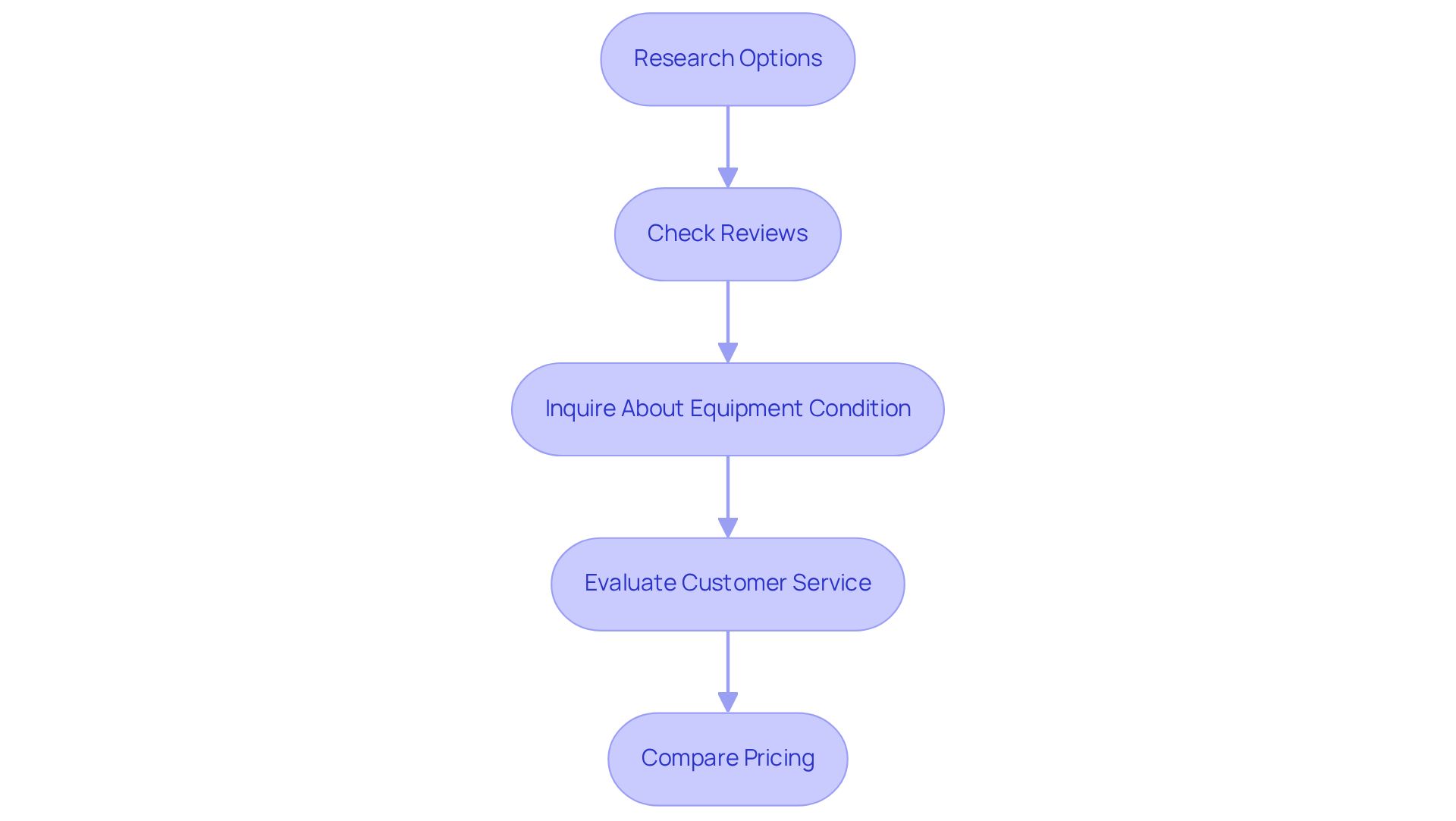
Review Rental Terms and Conditions
Before finalizing your rental, it is crucial to review the following terms and conditions thoroughly:
- Lease Duration: Familiarize yourself with the lease period and any penalties for late returns. Understanding this aspect will help you avoid unexpected costs.
- Usage Limits: Be sure to check for any restrictions on how the equipment can be utilized. Knowing these limits ensures compliance and prevents potential issues.
- Insurance Requirements: Some leasing firms may mandate insurance for the equipment. Clarifying this requirement before renting is essential to protect your interests.
- Maintenance Responsibilities: It is important to understand your obligations regarding upkeep during the lease period, including cleaning and minor repairs. This knowledge will help maintain the equipment in good condition.
- Deposit and Fees: Stay informed about any required deposits and additional fees that may apply, such as delivery or pickup charges. Being aware of these costs will help you budget effectively.
By thoroughly reviewing these terms, you can avoid misunderstandings and ensure a smooth rental experience. This proactive approach not only safeguards your investment but also enhances your overall satisfaction with the rental process.
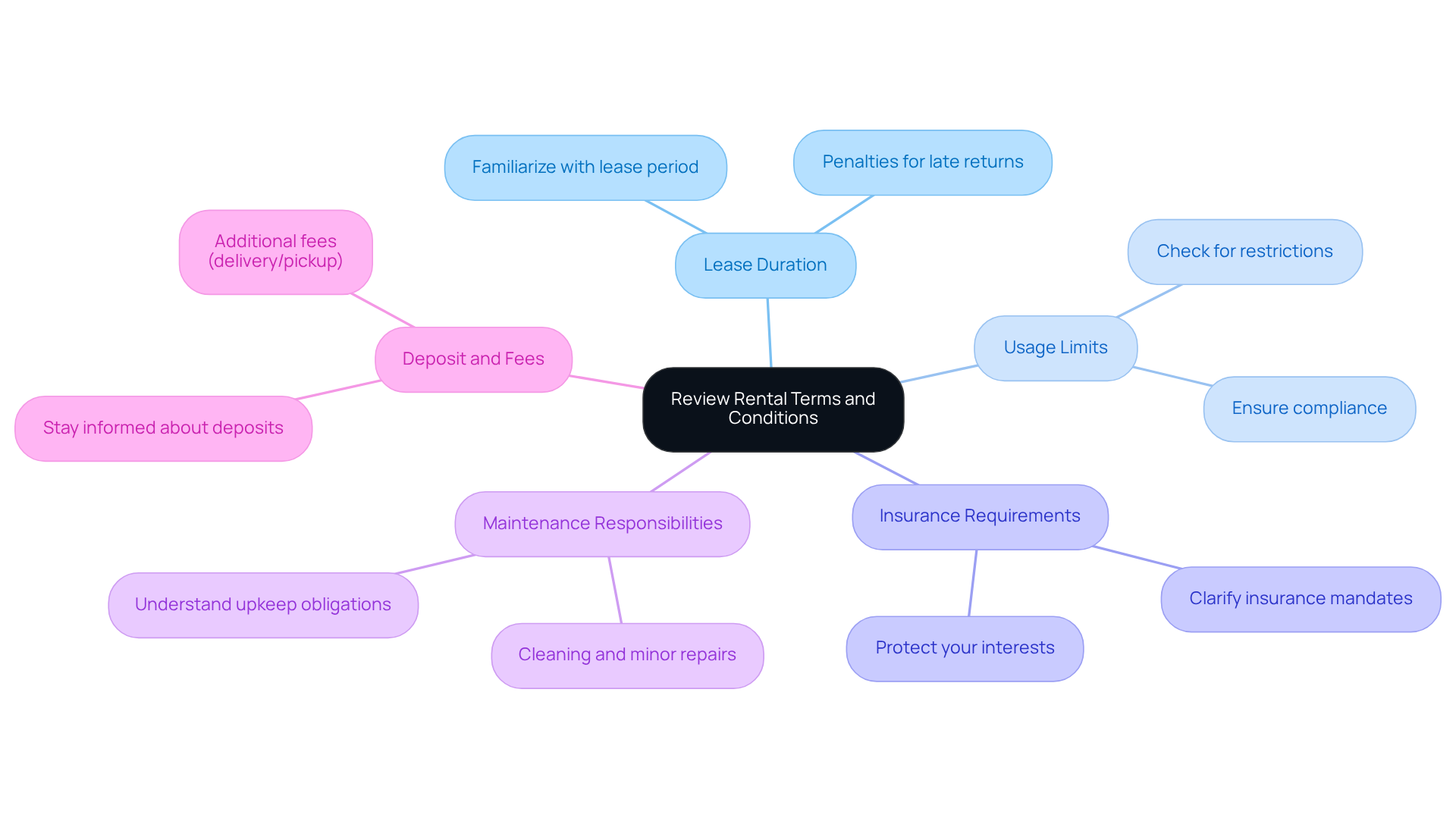
Handle and Maintain the Irrigation Machine Properly
To ensure the proper handling and maintenance of your irrigation machine, adhere to the following guidelines:
- Read the Manual: Familiarize yourself with the equipment's manual to fully understand its operation and maintenance requirements. This foundational step is crucial for effective usage.
- Inspect Before Use: Prior to starting, check the equipment for any visible damage or wear. Pay close attention to leaks, cracks, or loose parts that could affect performance.
- Clean After Use: After each use, clean the equipment thoroughly. This practice prevents dirt and debris from causing long-term damage, ensuring longevity.
- Store properly: If you are utilizing irrigation machine rental for an extended period, ensure it is stored in a dry, safe location. Proper storage is essential to prevent deterioration and maintain functionality.
- Report issues promptly: Should you encounter any problems during your irrigation machine rental, report them to the rental service immediately. Prompt communication can help avoid additional charges and ensure swift resolution.
By following these maintenance tips, you can guarantee that the irrigation machine operates efficiently throughout your project.
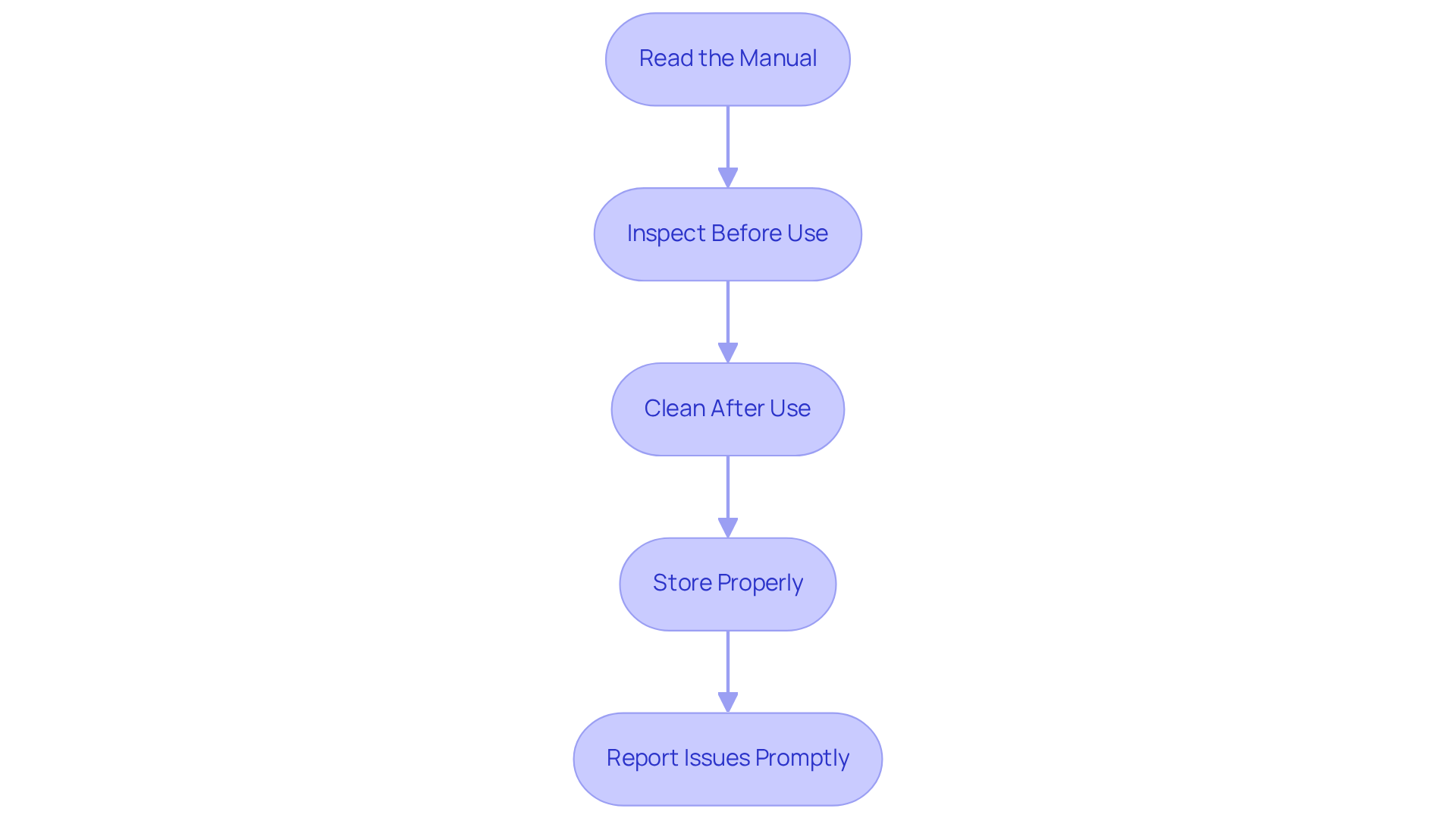
Conclusion
Understanding the intricacies of irrigation machine rental is pivotal for achieving optimal results in any irrigation project. Recognizing the various types of irrigation systems available, evaluating project requirements, selecting a reputable rental service, reviewing rental terms, and maintaining the equipment properly ensures a smooth and successful rental experience. Each step plays a crucial role in maximizing efficiency and effectiveness, ultimately leading to healthier plants and better resource management.
The article outlines essential steps, beginning with a clear understanding of different irrigation machines such as:
- Sprinkler systems
- Drip irrigation
- Center pivot systems
It emphasizes the importance of assessing project needs, including area size, plant types, and soil conditions. Furthermore, selecting a reliable rental service and thoroughly reviewing rental agreements are highlighted as key factors in avoiding potential pitfalls. Lastly, proper handling and maintenance of the rented equipment are underscored to prolong its functionality and performance.
In conclusion, adopting a methodical approach to irrigation machine rental not only enhances the success of your project but also promotes sustainable practices in water management. By implementing these strategies, individuals and businesses can make informed decisions that lead to effective irrigation solutions. Embrace these insights and take action today to ensure your irrigation needs are met with the utmost efficiency and care.
Frequently Asked Questions
What are the different types of irrigation machines available?
The main types of irrigation machines include Sprinkler Systems, Drip Irrigation, Soaker Hoses, Center Pivot Systems, and Subsurface Irrigation.
What is a Sprinkler System and when is it best used?
A Sprinkler System distributes liquid through a network of pipes and spray heads, ensuring even coverage. It is ideal for expansive spaces and larger areas.
How does Drip Irrigation work and what are its benefits?
Drip Irrigation supplies moisture directly to the roots of plants, minimizing evaporation and runoff. It is highly efficient for gardens and crops, ensuring that water usage is maximized.
What are Soaker Hoses and what applications are they suitable for?
Soaker Hoses allow liquid to seep out gradually along their length, making them perfect for flower beds and vegetable gardens. They promote healthy growth without the risk of over-saturation.
What is a Center Pivot System and its advantages?
A Center Pivot System rotates around a pivot point to irrigate large fields efficiently. It maximizes coverage and minimizes labor, making it a preferred choice for many farmers.
What is Subsurface Irrigation and its benefits?
Subsurface Irrigation involves burying pipes underground to deliver water directly to the root zone, effectively reducing evaporation. It is particularly beneficial in arid regions where water conservation is crucial.
What steps should be taken to assess project requirements for irrigation?
To assess project requirements, you should identify the area needing irrigation, evaluate plant types, assess liquid supply availability, consider soil category, and establish budget considerations.
Why is it important to evaluate the area that requires irrigation?
Measuring the total area is crucial in determining the type and size of the irrigation machine needed for optimal performance.
How do plant types affect irrigation needs?
Different plants have varying hydration needs, so understanding these requirements ensures their health and vitality during irrigation.
Why is liquid supply availability important in selecting an irrigation system?
The availability and pressure of your liquid source significantly influence the effectiveness of the chosen irrigation system for your project.
How does soil type impact irrigation efficiency?
Various soil types absorb water at different rates, making it essential to be familiar with your soil type to select the most suitable irrigation method.
How can budget considerations influence irrigation equipment rental?
Establishing a budget for renting equipment narrows down options and guides you toward the most viable irrigation solutions for your project.




